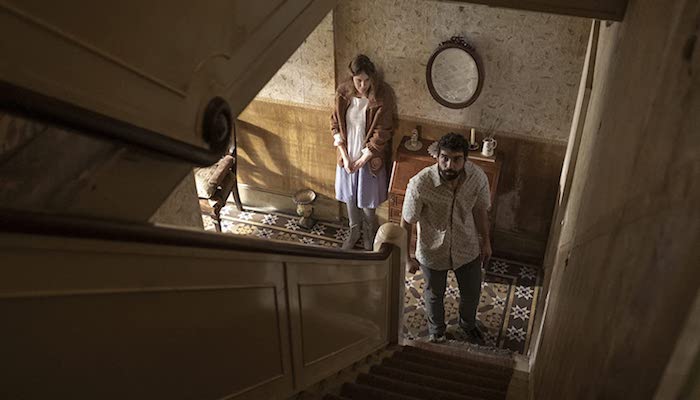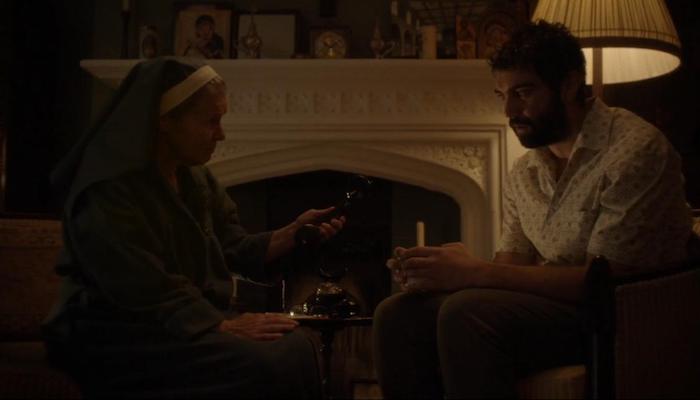People avoid introspection because they fear what it will uncover. The unknown can be terrifying, especially if it comes from within ourselves. But introspection also reminds us of what is already known but not yet reconciled, thus forcing us to confront that delayed task. Those moments are arguably the more challenging ones because they represent the things we were hoping the world would forget … so that we could do the same without any lingering guilt. Amulet, Romola Garai’s feature directorial debut, grapples with such past regrets and the messy ways with which we attempt to atone for them. Despite its elusive themes and murky constructs, its compact possession premise that dips its toes into cosmic terror is well worth a spot in the annals of modern horror.
Advertisement
Tomaz (Alec Secareanu) is a former grad student and soldier from an unspecified European war, currently living on the streets in London. He attempts to drown out his memories of enlistment through menial day labor, but they continue to haunt him every night in his dreams – so much so that he takes preventative measures like duct-taping his wrists together so as not to cause himself nor others harm while he sleeps. When he’s left scorched by a blazing fire that destroys his shelter, Tomaz is rescued by Sister Claire (Imelda Staunton) who nurses him back to health in her convent. Upon his recovery, she offers him a room in a rundown house in which Magda (Carla Juri) – another European immigrant like himself – and her sickly, reclusive mother also live. His only condition of residence is that he help with the building’s maintenance, as it’s been sorely lacking in upkeep. Tomaz is reluctant to give up his independence (especially to live in a place without electricity – a choice made out of fear that Magda’s mother will electrocute herself), but eventually agrees to stay out of remorse for Magda’s solitary and troubling existence. As time passes in the dank and musty old house, Tomaz uncovers surprises that come with nasty bites. Peculiar images trigger flashbacks to his military days, particularly of his encounter with a refugee on the run (Angeliki Papoulia). And the more Tomaz becomes attached to Magda, the more aggressive her mother acts towards them both. Tomaz’s patience and determination is tested, and he begins to wonder if Sister Claire’s charitability was merely a front to hide more sinister intentions.
Amulet is not really a character piece nor a single-location thriller, but Garai uses those formats as starting points on which to build a strong foundation. She leans into the dusty, low-lit interiors of the haunted house archetype while also digging into the psychological aspect of trauma caused by memories. It allows for her to utilize the crude jump scares of monster movies (such as toilet-dwelling, bat-like creatures) while also playing into the emotional ambiguity that comes with parsing the past. Tomaz is a victim of this house as much as he’s a victim of his own history, creating an oblique comparison for his feelings of entrapment. The set-up also allows Garai to elaborate on the timely topic of xenophobia, of how Westerners unabashedly disrespect immigrants but are more than willing to force them to do their dirty work (emphasized in Amulet by … well, monster eradication). And yet, (harkening back to my opening statement) what Amulet stresses is not just fear of the past with regards to what’s been done unto you, but also in relation to what you’ve done unto others (a sort of inverted, though thematically-appropriate, bastardization of both the Lord’s Prayer and the Golden Rule). As the film progresses, we learn that Tomaz is not as noble as we initially thought, and that despite whatever good intentions he might have been or currently is harboring he has yet to repent to those for whom he has caused harm. He has done an evil thing for which he has not (and arguably should not) be forgiven, and this revelation forces us to reevaluate our character allegiances and also question who the real “monster” is. By the end we feel lost and confused on account of Garai’s obtuse framing, but it’s really an affirmation of the cruel, nonsensical uncertainty of life. Garai’s presentation, convoluted at times as it may be, reinforces the paradoxical dichotomy within even our most stoic of “heroes”. She forces us to discard our concepts of moral absolutism, and to reframe our perceptions to account for humanity’s penchant for cognitive dissonance. As audience members it’s frustrating to have to rework our own allegiances in real time, as we’d rather work on easy, black-and-white terms than deal with those uncomfortable shades of gray. However, acknowledging this co-existence of conflicting moralities and multiple truths – and the confusion they can cause – is the ultimate point, and doing so reminds us why facing up to that conflict of character – within ourselves and/or others – can be as terrifying as it is.
But even within this brilliant horror thesis Amulet hits some rough patches. The flashbacks are edited in an effectively diffusive manner but the film’s overall pacing is admittedly very slow – so much so that we become distracted simply by the occasional lack of progression. Sarah Angliss’ music doesn’t serve as a cue for action as much as it does for mood, yet its choral bars are incredibly overbearing. And despite wrangling a terrific supporting cast (Staunton is her impeccable best, as per usual), a talent as great as Papoulia is sorely underserved by Garai not fully utilizing her fierce conviction in a way that, say, a Lanthimos would. Still, Amulet is complex and freaky enough to satisfy those with an ethereal craving to their horror. It’s a calm and collected unraveling of secrets that exposes an underlying messy madness. Repent, and maybe you’ll be forgiven. Rating: 7/10 Leave your thoughts on this Amulet review and the film below in the comments section. Readers seeking to support this type of content can visit our Patreon Page and become one of FilmBook’s patrons. Readers seeking more film reviews can visit our Movie Review Page and our Movie Review Pinterest Page. Want up-to-the-minute notifications? FilmBook staff members publish articles by Email, Twitter, Instagram, Tumblr, Pinterest, and Flipboard.


